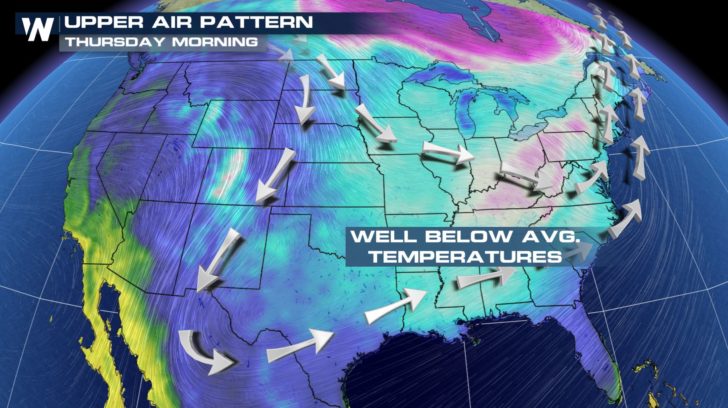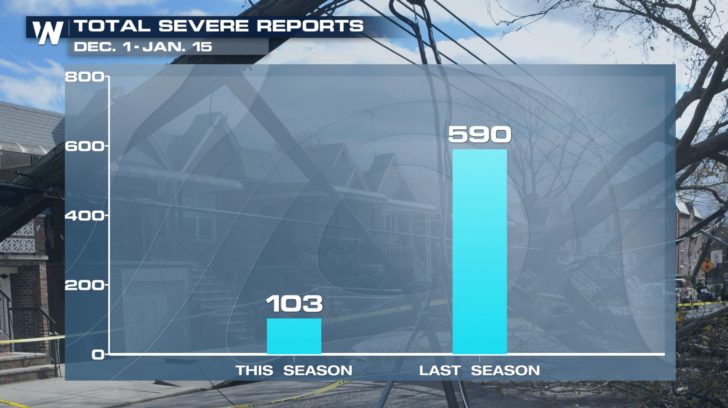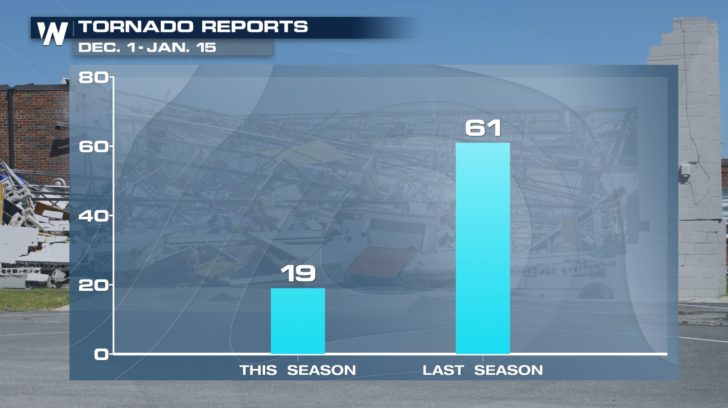Recent Cold Weather Has Helped Limit Severe Weather
Special Stories
18 Jan 2018 9:00 PM
https://youtu.be/WBSSFoUS09o
The record setting, bitter cold that gripped much of the Lower 48 in December and January has actually had a beneficial side regarding severe weather; less of it.
Dr. Patrick Marsh, who monitors severe weather at the Storm Prediction Center, says the cold pattern helped push away the moisture that severe storms depend on. “As we’ve had continued cold air intrusions to the East, it goes out into the Gulf (of Mexico), we scour out the moisture out of the Gulf of Mexico. So it makes it really hard to get that key ingredient back into the United States,” explains Dr. Marsh.
 This picture demonstrates the colder plunge of air for much of the eastern United States, resulting in the moisture needed for storms to be pushed out of the South.
Since December 1, there have been about 20 observed tornadoes across the country compared to about 60 during that time last season. In terms of total severe reports, there have been more than 100 this season but nearly 600 last season.
This picture demonstrates the colder plunge of air for much of the eastern United States, resulting in the moisture needed for storms to be pushed out of the South.
Since December 1, there have been about 20 observed tornadoes across the country compared to about 60 during that time last season. In terms of total severe reports, there have been more than 100 this season but nearly 600 last season.
 Data courtesy the Storm Prediction Center. Link http://www.spc.noaa.gov/exper/archive/events
Data courtesy the Storm Prediction Center. Link http://www.spc.noaa.gov/exper/archive/events
 Data courtesy the Storm Prediction Center. Link http://www.spc.noaa.gov/exper/archive/events
Dr. Marsh says last season's severe weather outbreak between January 20-22 resulted in 20 confirmed fatalities, “Just because we’re quiet right now doesn’t’ mean that it’s always quiet this time of the year.” Statistically December, January, and February are the three 'quietest' months regarding severe weather. However in the case of last January's deadly tornadoes, it shows that dangerous storms can occur in any month.
Dr. Marsh says it’s unclear if this quieter fall/winter season will lead to less severe weather this spring. “In terms of the seasonal prediction, it’s a little too early to nail down how the spring will be. As long as we stay in this kind of pattern where we have northwest flow across the eastern two-thirds of the United States bringing in colder air, it’ll be really hard to get severe weather.”
That’s why as we head into the peak months of severe weather, beginning in April, you should have your tornado plan ready. “Just because we don’t have severe weather now and it’s not foreseeable, it doesn’t mean that it’s not going to happen. It will eventually happen and it typically comes with a vengeance,” says Dr. Marsh.
When that happens, we here at WeatherNation will keep you informed of what to expect before, during, and after the storms.
For WeatherNation, Meteorologist Steve Glazier
Data courtesy the Storm Prediction Center. Link http://www.spc.noaa.gov/exper/archive/events
Dr. Marsh says last season's severe weather outbreak between January 20-22 resulted in 20 confirmed fatalities, “Just because we’re quiet right now doesn’t’ mean that it’s always quiet this time of the year.” Statistically December, January, and February are the three 'quietest' months regarding severe weather. However in the case of last January's deadly tornadoes, it shows that dangerous storms can occur in any month.
Dr. Marsh says it’s unclear if this quieter fall/winter season will lead to less severe weather this spring. “In terms of the seasonal prediction, it’s a little too early to nail down how the spring will be. As long as we stay in this kind of pattern where we have northwest flow across the eastern two-thirds of the United States bringing in colder air, it’ll be really hard to get severe weather.”
That’s why as we head into the peak months of severe weather, beginning in April, you should have your tornado plan ready. “Just because we don’t have severe weather now and it’s not foreseeable, it doesn’t mean that it’s not going to happen. It will eventually happen and it typically comes with a vengeance,” says Dr. Marsh.
When that happens, we here at WeatherNation will keep you informed of what to expect before, during, and after the storms.
For WeatherNation, Meteorologist Steve Glazier
 This picture demonstrates the colder plunge of air for much of the eastern United States, resulting in the moisture needed for storms to be pushed out of the South.
Since December 1, there have been about 20 observed tornadoes across the country compared to about 60 during that time last season. In terms of total severe reports, there have been more than 100 this season but nearly 600 last season.
This picture demonstrates the colder plunge of air for much of the eastern United States, resulting in the moisture needed for storms to be pushed out of the South.
Since December 1, there have been about 20 observed tornadoes across the country compared to about 60 during that time last season. In terms of total severe reports, there have been more than 100 this season but nearly 600 last season.
 Data courtesy the Storm Prediction Center. Link http://www.spc.noaa.gov/exper/archive/events
Data courtesy the Storm Prediction Center. Link http://www.spc.noaa.gov/exper/archive/events
 Data courtesy the Storm Prediction Center. Link http://www.spc.noaa.gov/exper/archive/events
Dr. Marsh says last season's severe weather outbreak between January 20-22 resulted in 20 confirmed fatalities, “Just because we’re quiet right now doesn’t’ mean that it’s always quiet this time of the year.” Statistically December, January, and February are the three 'quietest' months regarding severe weather. However in the case of last January's deadly tornadoes, it shows that dangerous storms can occur in any month.
Dr. Marsh says it’s unclear if this quieter fall/winter season will lead to less severe weather this spring. “In terms of the seasonal prediction, it’s a little too early to nail down how the spring will be. As long as we stay in this kind of pattern where we have northwest flow across the eastern two-thirds of the United States bringing in colder air, it’ll be really hard to get severe weather.”
That’s why as we head into the peak months of severe weather, beginning in April, you should have your tornado plan ready. “Just because we don’t have severe weather now and it’s not foreseeable, it doesn’t mean that it’s not going to happen. It will eventually happen and it typically comes with a vengeance,” says Dr. Marsh.
When that happens, we here at WeatherNation will keep you informed of what to expect before, during, and after the storms.
For WeatherNation, Meteorologist Steve Glazier
Data courtesy the Storm Prediction Center. Link http://www.spc.noaa.gov/exper/archive/events
Dr. Marsh says last season's severe weather outbreak between January 20-22 resulted in 20 confirmed fatalities, “Just because we’re quiet right now doesn’t’ mean that it’s always quiet this time of the year.” Statistically December, January, and February are the three 'quietest' months regarding severe weather. However in the case of last January's deadly tornadoes, it shows that dangerous storms can occur in any month.
Dr. Marsh says it’s unclear if this quieter fall/winter season will lead to less severe weather this spring. “In terms of the seasonal prediction, it’s a little too early to nail down how the spring will be. As long as we stay in this kind of pattern where we have northwest flow across the eastern two-thirds of the United States bringing in colder air, it’ll be really hard to get severe weather.”
That’s why as we head into the peak months of severe weather, beginning in April, you should have your tornado plan ready. “Just because we don’t have severe weather now and it’s not foreseeable, it doesn’t mean that it’s not going to happen. It will eventually happen and it typically comes with a vengeance,” says Dr. Marsh.
When that happens, we here at WeatherNation will keep you informed of what to expect before, during, and after the storms.
For WeatherNation, Meteorologist Steve GlazierAll Weather News
More